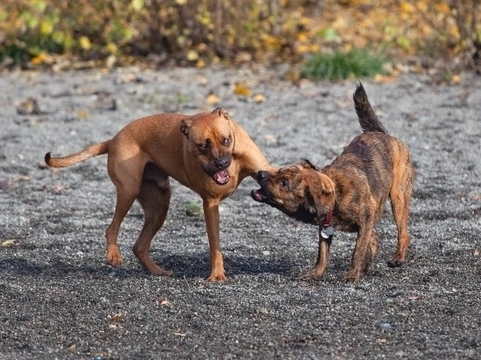
Managing and curbing a dog that bullies other dogs
Allowing dogs the opportunity to socialise with other dogs is of course a vital part of canine development, and all dogs should ideally learn good socialisation skills and appropriate play with others when they are young. However, for various different reasons, some dogs always take the alpha role in play, and in some cases, take this to the extreme of bullying, making life and playing unpleasant for the other dogs involved.
Bullying in play can of course lead to more serious problems such as fights and injuries, but even so, it is not appropriate to allow one dog to bully its peers in play anyway; but if your dog is the bully in the dog park, what can you do about it? Stopping your dog from playing with others and keeping them away from other dogs all the time is counterproductive, and can lead to worse problems down the line.
If your dog is a bully where playing with other dogs is concerned and you’re not sure how you should address this, this article will cover the problem in more detail. Read on to learn more about managing and curbing the behaviour of a dog that bullies other dogs.
How can you identify bullying in play?
Because dogs’ communication methods with each other are different to those that we as humans use, it can be hard to tell the difference between genuine play and deliberate bullying where dogs are concerned. The true judge of whether or not another dog is being bullied comes from how the other dog responds or feels about the behaviour they are being exposed to; while some dogs will view it as rambunctious but appropriate play, others will not be so keen!
The indication of bullying behaviour is when the other dog in question backs off or gives clear signs that they are no longer having fun and want the other dog to stop, but the bullying dog does not respond to these cues to moderate their behaviour.
Keep an eye out for the following signs and cues of potential bullying in the dog:
- Actively steals toys or resources from other dogs and will not share
- Pushes other dogs out of the way physically to get things they want
- Dominates and overwhelms other dogs when playing
- Does not read and respond to “back off” signals from other dogs
- Harasses dogs that are indicating that they do not want to play
- Pushes other dogs around physically, and forces submission
- Physically pins other dogs down or forces them to the ground
What to do if your dog is bullying others
Once you have established that your dog has some of the traits of a bully and that they are apt to bully other dogs in a play situation, what can you do about it? There are a variety of different ways in which you can address the problem and get things back under control, and work on your dog’s communication and behaviour with others for the long term.
Know when to intervene
If your dog is going over the top and making things uncomfortable for their play partners, once the other dog starts displaying the “back off” cues and your dog does not comply, you will need to intervene yourself. Recall your dog and put them on a time out until they have calmed down, and do not let them off to play again until they are calm and responsive to your commands.
Use diversions
In some cases, you will not need to stop the game entirely, but simply use something to divert your dog for a few moments so that the other dog gets the chance to retreat, and your dog’s mood will be broken, giving them a chance to cool down.
A whistle command for “stop that!” and training your dog to react to it can prove effective, as can recalling your dog for a treat, before letting them go back to play.
Pick your dog’s playmates well
It would be unwise to try to deliberately pair your bullying dog with another pushy, bolshy dog, as the two may end up fighting. However, try to select confident, bold playmates for your dog who are not physically small enough to be pushed around with ease, and who will not be afraid to put your dog in their place if they go too far.
Teach your dog better impulse control
Dogs should learn social skills such as bite inhibition and how to respect the responses of others while they are young, and these skills will set your dog up for the rest of their life. However, if your dog has failed to learn these skills when young, you may need to work with them intensively to develop the skills when they are older, by training them in-depth or calling in a behaviourist to help you to modify your dog’s behaviour.
Make sure your dog has all of their needs met
While correct exercise and ensuring your dog is not always living life at top speed will not necessarily stop a bully, a dog that is full of beans and that does not have enough outlets for their energies will be more likely to act up. Walk your dog and wear them out a little before you take them to play, so that they have worked some of their energy out of their system!



